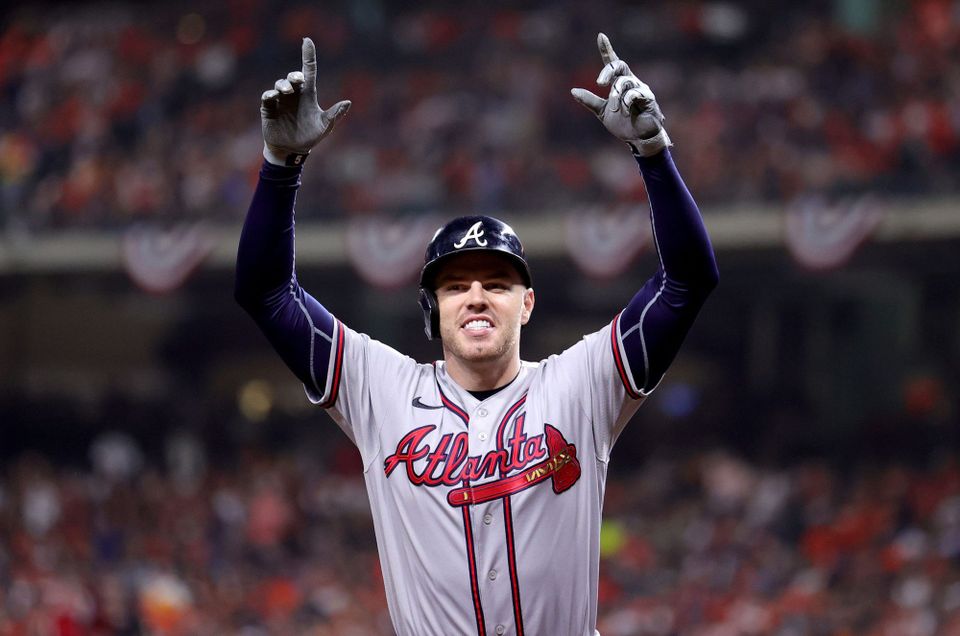What BYU's seniors need to learn from Freddie Freeman

If you've followed me on the Twitter machine this week, you know about the emotional roller coaster that I have been on. I'm a lifelong, die-hard fan of the Atlanta Braves. In fact, I tell people that I am a bigger Braves fan than I am BYU fan - and I think that's probably still accurate.
My dad worked for Turner Broadcasting for a bit in the mid-90s. We lived just outside Atlanta. I remember my elementary school pulling all of the students into the gym and cafeteria (needed both rooms because of the number of students) to watch the NLDS in 1996 when the Braves had an afternoon game against the Los Angeles Dodgers. I remember showing up early at Fulton County Stadium hoping to get a glimpse of Greg Maddux. I remember the rise of a young Chipper Jones. The Braves are part of me.
And this week, the Braves said (unofficially) goodbye to Freddie Freeman. He's been in the organization for 15 years. He won an MVP. He led the Braves to a World Series championship last year. He was the Atlanta Braves. And now he's headed elsewhere.
And I'm sad about it.
Freddie on the field was a great player, but Freddie off the field and in the locker room is what made him so valuable for the Braves. Allow me to tell a tale:
Joc Pederson was traded from the Chicago Cubs to the Braves just before the trade deadline this past season. Pederson had played with the Dodgers for the early chunk of his career and then a half-season with the Cubs. So, he had been around winners and championship-caliber players for his entire career.
A few weeks after he arrived in Atlanta and started to play, he approached management requesting a day off because of a sore thumb. Freddie got wind of the request and told Pederson, "We don't miss games for sore thumbs around here."
Pederson was taken aback. He called his former teammate Jason Heyward, who also happens to be one of Freddie's best friends, and asked him what was wrong with 'his boy.' Heyward's response was simple. "That's just Freddie. He wants to win."
Freddie knew that Pederson at 85% was better than whoever the backup was at 100%. 85% of Pederson could win games, but 100% of some minor leaguer that would have been called up might not get things done.
Freddie also walked the walk. He played through injuries, he fought and fought to be in the lineup every single day. Unless he was physically unable to play, he was playing. Because he knew that he helped the team win.
A few years ago, Freddie went down to a gnarly injury in the middle of the season. The Braves responded by signing power hitting Matt Adams to play first base. When he got to Atlanta, he tore it up and became a valuable part of the lineup. When Freddie's injury healed and he was ready to return to the lineup, he knew that Adams in the lineup gave his squad the best chance to win. So what did Freddie do?
He came back as a third basemen. The All-Star, future MVP, and arguably the best first basemen in the game, came back as a third-basemen. Because winning meant more than anything else.
That's the kind of leadership that BYU needs this year.
The Cougars have a major opportunity in front of them. BYU will be ranked inside the preseason Top 25. They have five games against Power 5 teams and four of those games are Top 25 caliber teams. They play a really tough Utah State team and an experienced Boise State team. The Cougars have chances to make big statements on a national stage.
BYU is loaded with talented players who are experienced as well. But their priorities will be tested - where does winning fall on their priority list?
Jaren Hall proved that winning meant everything to him. He cracked a rib during BYU's season opener last year against Arizona. He continued to play through the injury and led the Cougars to wins over Utah and Arizona State. He played as long as he could until the injury forced him of the field. Two weeks later, he came back. Hall wanted to win more than Hall wanted anything else.
Tyler Allgeier was wired that way too. Winning meant something, and he wanted to win. He did everything in his power to give BYU wins, from taking an absolute beating when he carried the ball 30 times in a game, or chasing down a defender after a turnover to force a fumble - Allgeier wanted wins.
Football is different than baseball. Realistically, there are two teams. There is the offensive team and the defensive team. Leaders are needed on both sides of the ball. Hall is a natural leader for the offense. Who will step up on the defense? Who is going to stand up and tell a teammate, "We don't miss games for sore thumbs around here." Who is going to be willing to change positions in order to get someone else on the field so that the Cougars have their best chance of winning?
Who is going to be BYU's Freddie Freeman?
What are the coaches going to do to enable someone to step up and be a Freddie Freeman?
How will the program cultivate an environment that makes it possible for a player to stand up and say, "Look, you're telling me I'm 95%. I'm playing. I'm not waiting for 100%."
It's a tough balance in football. Everyone is hurt, but not everyone is injured.
But Freddie's leadership is about more than playing through an injury - it's about putting winning ahead of anything else. And whether it's baseball or football or ping pong in your basement, winning is a language that every competitor understands.
